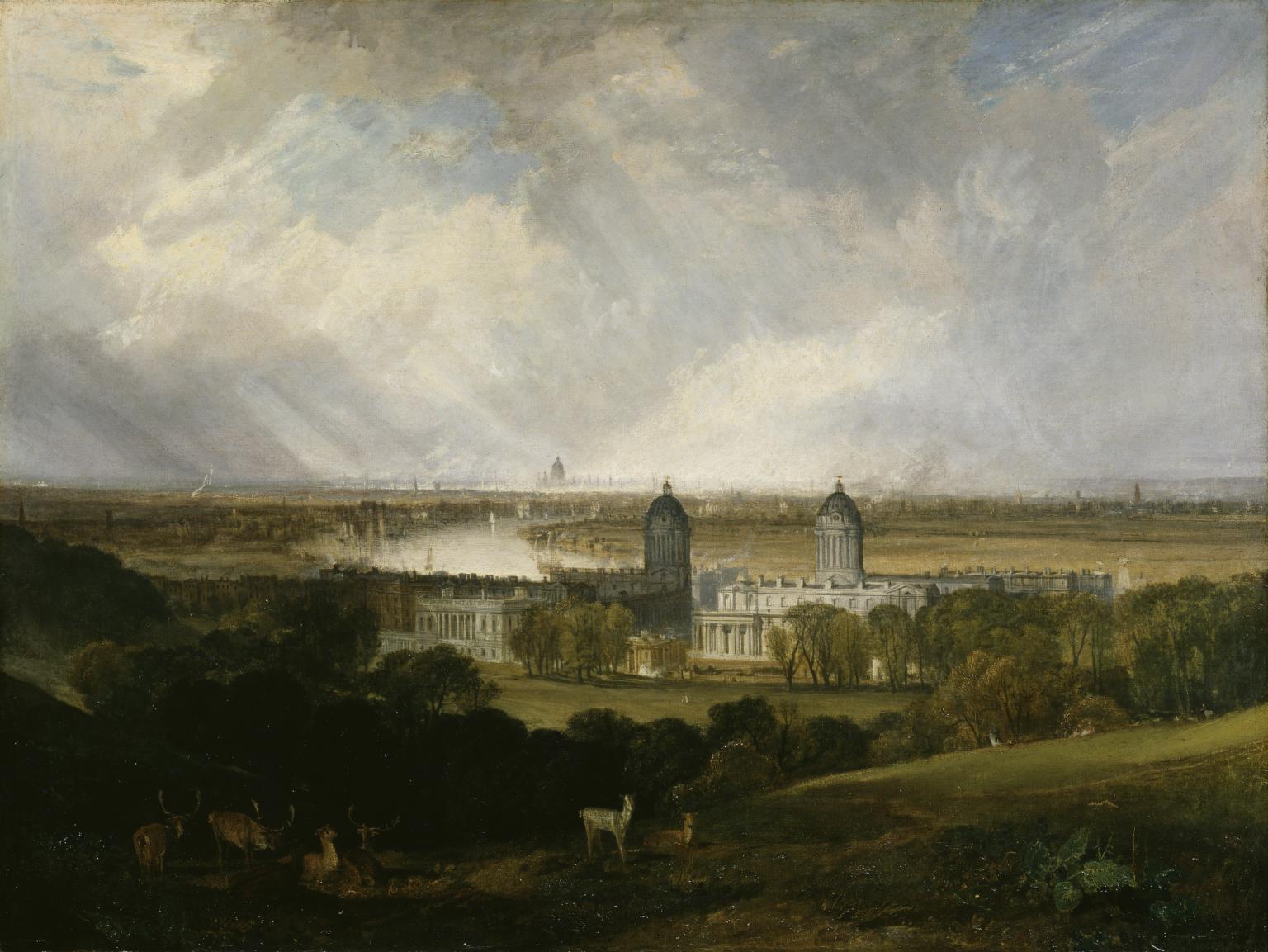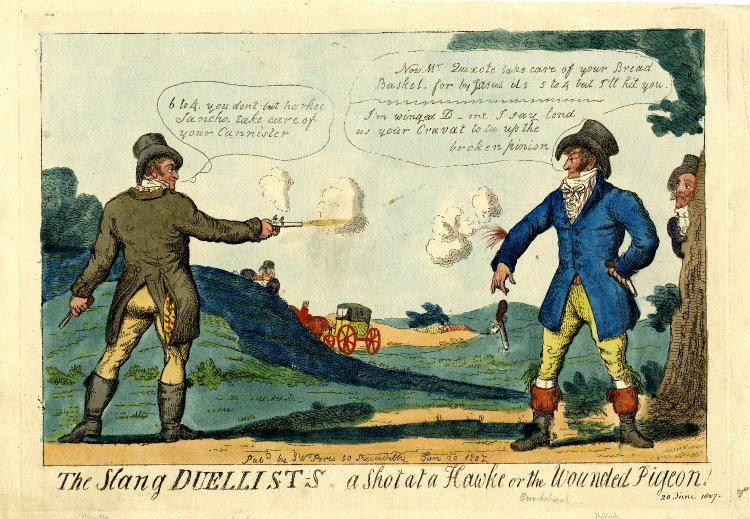This is from ‘The Herald of Peace’, Volume 8, the same volume that had the outraged letter about “Duelling Legislators” These are the final two reports about duels in 1832. In these two, Dan O’Connell’s son Maurice is in the first, and his nephew William in the second.
Mr Blennerhassett, of Ballyseedy, a highly respectable gentleman, had taken the liberty of canvassing for Sir Edward Denny some voters in Tralee, that had previously promised to vote for Mr M. O’Connell, [Maurice, one of Dan’s sons] who having stood for Drogheda and Clare in the course of his brief parliamentary existence, is now up for Tralee. Although it might be considered by any body else that a gentleman might fairly canvass on behalf of his friend any portion of a constituency, Mr M. O’Connell thought otherwise, and on Thursday evening, December 6th [1831], drove to Mr Blennerhassett’s residence, where Mrs Blennerhassett had been that day confined. Mr Blennerhassett was not at home, but received a letter from his visitor requesting to see him on particular business. Knowing, says the Irish paper, that Mr O’Connell could have no business with him, except to insult him he thought the less delay the better, and immediately apprised him that he would be at Berner’s Hotel at eight that evening. At the appointed hour Mr M.O’Connell, with two friends entered, the room where Mr Blennerhassett was seated. After some conversation respecting the canvass, in which Mr Blennerhassett declared his resolution to persist in the course he had taken that gentleman observed that he knew Mr M.O’Connell’s object was to insult him, and as his visit had made Mrs Blennerhassett acquainted with his intentions, he (Mr B) was ready to meet Mr O’Connell in two minutes in the long room of the hotel. Mr M. O’Connell appeared very much agitated, and left the room without saying any thing more. In about two hours after, however, he returned and said to Mr Blennerhassett, “ I stated before that you were the only gentleman in Kerry that would act as you have done; I now say no gentleman would do so. “ Mr Blennerhassett immediately referred Mr O Connell to a friend, and the preliminaries being arranged, the parties met at nine o clock, and after exchanging three shots without effect, the principals were taken off the ground by their friends. – The Atlas p 819
The total electorate was only 180 men, and Maurice O’Connell won the election and served as the M.P. for Tralee until his death in 1853. Arthur Blennerhassett was elected as the M.P. for Kerry in 1837. The Atlas also gets the time of the duel wrong. It, in fact, took place at five o’clock in the morning on Friday 30th November [The Times, 6 December, 1832].
DUEL IN GREENWICH-PARK, BETWEEN LIEUTENANT WILLIAM O’CONNELL AND MR. CARNEY – The Times, Friday,14 December 1832

Yesterday morning [13 December 1832] a meeting took place in Greenwich. park, between Lieutenant O’Connell, nephew to Daniel O’Connell, Esq., and Mr. Carney; the latter gentleman was severely wounded. The circumstances which led to the transaction are said to be these:-
Mr. O’Connell and a friend of his on Saturday evening last were at a fashionable hell in St. James’s-street, when they saw some unfair play practised upon a young gentleman who had been entrapped to play by the black-legs connected with the establishment. Mr. O’Connell stood forward and openly acquainted the young gentleman, who had already lost a very considerable sum of money, of the manner in which he was being duped by the parties concerned in the game. Mr. O’Connell’s exposure gave rise to a most serious quarrel, which ended in a general fight and a challenge. The parties agreed through their seconds to meet at 8 o’clock yesterday morning in the deer-park at Greenwich. At 5 o’clock in the morning Mr. O’Connell left his lodgings in Beaufort-buildings, Strand in a post-chaise attended by his second, Mr. Cordey, and carrying with him a brace of duelling-pistols which he had procured at Mr. Tatham’s, at Charing-cross, the night before.
On reaching the ground (a retired part of the park) at the appointed time, they found Mr. Carney had arrived with his friends before them. A reconciliation was endeavoured to be effected by the seconds of the adversaries, but could not, and the ground having been stepped, the parties fired, when Mr. Carney received the ball of his antagonist just about the right hip, which it passed completely through. The unfortunate gentleman fell to the ground, and was instantly placed in his carriage, and conveyed with all haste to town, where he was promptly attended by Mr. White. of Parliament-street, who dressed the wound which it is believed will not turn out fatal. Before the whole of the parties left the ground a policeman of the R. division arrived, and arrested Mr. O’Connell and his friend who were conveyed before the magistrate in the town, and the charge having been preferred, Mr. O’Connell was ordered to find bail in the sum of 500s. [present day value £ 31,000.] Mr. O’Connell despatched a messenger to his friend, Captain Larkin, of Greenwich College, who having entered into the required sureties, he was allowed to depart, until he was called upon to make his future appearance. Mr. O’Connell on his arrival in town returned the pistols to Mr. Tatham and then left London for Chatham. Mr. Carney, it is said, keeps a house in Jermyn-street, St. James’., where the quarrel above alluded to took place.
The following was added in a report in The Herald of Peace, Volume 8 published By Hamilton Adams & Co, 33 Paternoster Row, London 1832. The Herald of Peace quoted the Times verbatim up to this point, then added its own points.
Without inquiring what business took Mr O’Connell and his friend to a fashionable gambling house (perhaps it was curiosity as they appear to have been spectators only), we cannot but approve of his attempt to rescue the victim of the black legs from their ruinous grasp; but his acceptance of a challenge from one of these harpies cannot be too strongly condemned. Duelling is indefensible in itself, and one of the evils attending it is, that it sometimes places the life of a useful member of society in the same jeopardy as that of a villain of a nuisance to society.
Of the foregoing duels, [There were seven reports in total] all, excepting the last, originated in electioneering quarrels, and to the disgrace of our country, in most of them we meet with candidates for seats in a Reformed Parliament. [It is probably worthwhile pointing out that 30% of the duels involved the O’Connells.] On this point, as well as others, individual reformation is much wanting. In page 508 of this number of our Work, is an article on Duelling Legislators which contains some appropriate remarks; but effectually to wipe out this stain on our nation, some legislative restraint is necessary. Let the Reformed Parliament enact, “ that any person who had been concerned in a duel within such a date, shall be disqualified from having a seat in Parliament;” and further, “ that any member of the House of Commons who shall send or accept a challenge, shall vacate his seat in Parliament, as being thereby disqualified for the same.“ Such an enactment would, by bringing the custom of duelling into disrepute, be a national benefit.
We have always understood that duelling was prohibited by the articles of war as well as by the civil law of the land; but by the following report of the decision of a court martial which was held at Velore, Hindostan, it appears that in our dependencies in the East Indies, instead of duelling being discouraged by the civil and military authorities, it is enforced as a duty on the military profession; so that those who have sufficient moral courage to refuse conformity to a custom which is prohibited by the laws of their country as it is by the law of God, do it at the risk of being expelled the service, – a service we cannot approve; yet we heartily hail every advance towards more correct views in those who are engaged in it.
A court martial was held at Vellore, Jan 9. 1832, on Ensign J A Crawford, 4th Native Infantry, for “ having submitted to be called a liar by Ensign W Lawless Seppings, of the same regiment, without taking any measures to remedy the insult.” The Court found him guilty, and sentenced him to be discharged from the Company’s service which was confirmed. : – The Times
Our legislature is imperatively called upon to inquire into the decision of this East India court martial, and adopt such measures as will be calculated to check, instead of offering, a premium for transgressing the laws of God and of man.

